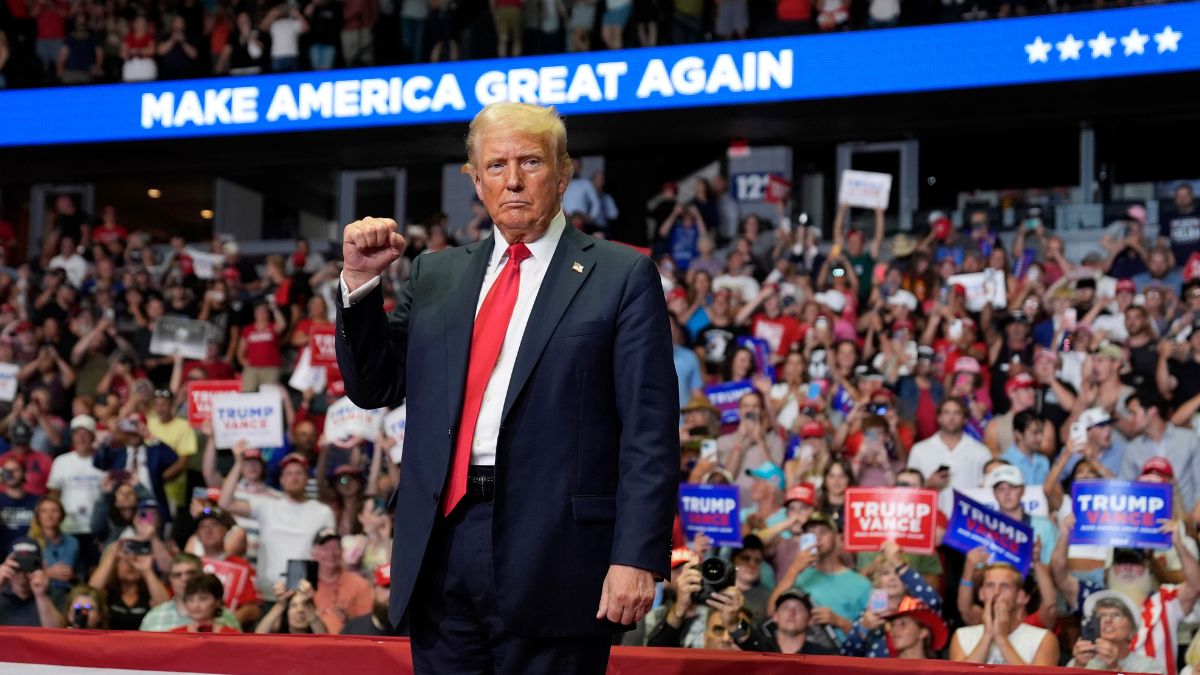Donald Trump accepted the Grand Old Party’s presidential nomination on June 18 at the Republican National Convention in Butler, Pennsylvania. With less than four months left for the election and Democrats seemingly on the back foot, Trump’s return to the White House seems imminent.
After many days of speculation and calls from his party men, President Joe Biden announced his exit from the 2024 presidential election race on July 21, endorsing Vice President Kamala Harris for the democratic nomination.
The winds seem to have shifted decisively in favour of Republicans on account of an assassination bid on Trump. This incident is poised to reshape the presidential elections. Trump’s rebellious image with fist raised shouting ‘fight, fight!’ will become the defining campaign poster in the run-up to the polling date in November.
Trump is expected to attract sympathy votes, likely resulting in a substantial boost. His 3-6 per cent advantage in post-debate surveys is set to expand further. If ballots were cast today, his victory would seem almost inevitable.
There is little doubt that the political atmosphere in the US is highly charged. Domestically, American society is divided on several policies as well, and that can be seen in recent events. On foreign policy, especially on regional conflicts—the Russia-Ukraine war in Europe and the Hamas-Israeli wars in West Asia—the US public opinion is strongly divided.
Therefore, anticipating the political outcome of US elections in November, dynamics of conflict in West Asia and Europe would take turn pointing more towards continuity of Trump’s strategic policies, which had begun in 2016.
Impact Shorts
More ShortsShifting Focus on China
If Trump wins the November presidential election, he could turn global politics on its head. Trump may shift America’s focus from NATO, Europe, and the Atlantic to the South Pacific and what he calls the world’s principal global threat: China. Trump may double or triple tariffs on Chinese imports, setting off a new trade war. Hence, it is essential to analyse the White House’s foreign policy choices regarding ongoing conflicts/wars in Europe and West Asia, which are extremely important regions for the US.
On the Russia-Ukraine war in Europe, he may stop the intensity of aid and weapons to Ukraine, as he has pledged to end them on the negotiating table, not the battlefield. Under Biden, a Cold War politician, the US pinned itself in Europe, disillusioning itself about the real threat.
The US confronts an existential threat from China, surpassing the challenges posed by the former Soviet Union and present Russia. China’s economic prowess, technological advancements, and global influence present a multifaceted and formidable challenge in the 21st century.
Despite focusing on China, especially in the South China Sea, Biden forced the US to focus on Russia through NATO expansion. This not only engaged the US in Europe but also pushed Russia closer to China. Taking note of his previous engagements with Russian President Vladimir Putin, Trump understands the geopolitical shift, and he may likely put an end to the Russia-Ukraine war on the negotiating table.
On West Asia
The second war that impacted the US in the West Asia region is the ongoing Hamas-Israel war and the apprehension of spilling over to Lebanon. This is the second place where the US is pinned down with its resources before the South China Sea. Israel, an exceptional ally of the US, started a war to eradicate Hamas in Gaza following the October 7 attack. Over 38,000 people died, including 15,000 children, which has maligned the Israel and US credibility and image on the international stage.
The Biden administration supported Israel with weapons and also vetoed several resolutions in the United Nations against it. However, there were situations where the US posed grave concerns over Israeli actions in Gaza, stopped military shipments to Israel in order to force Israel for a cease-fire, and reacted very coldly when Iran (a supporter nation of the Palestinian cause and an archrival of Israel and the US) directly attacked Israel.
Observing Trump’s first term, one can anticipate a relatively tougher stance in West Asia. Trump may unequivocally support Israel in its war with Hamas and even with Hezbollah, a Shia militia and political organisation in Lebanon well supported and funded by Iran. Previously, Trump unilaterally withdrew the US from the Joint Comprehensive Plan of Action (JCPOA), simply known as the Iran Nuclear Deal, keeping Israeli interests in mind. The Trump administration used a maximum pressure campaign and intensified sanctions against Iran after the United States exited the JCPOA in 2018.
If Trump returns to the White House after the November presidential election, we would expect US foreign policy during his first term (2017-21) to kick-start, particularly regarding ongoing conflicts in Europe and the Middle East. His approach to the Russia-Ukraine war may involve a swift push for negotiations, potentially altering the course of the conflict.
In West Asia, the Trump administration would likely maintain support for Israel while taking a hardline approach towards Iran. Furthermore, a second Trump presidency could see a marked shift in focus towards countering China’s growing influence, potentially escalating economic tensions through increased tariffs and trade restrictions.
Anmol Kumar is a Research Assistant at Pondicherry University. Vijay Maidergi is a PhD scholar. The views expressed in the above piece are personal and solely those of the authors. They do not necessarily reflect Firstpost’s views.
)